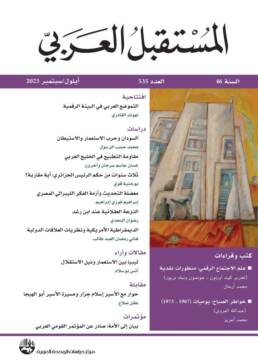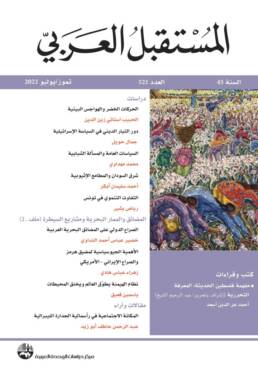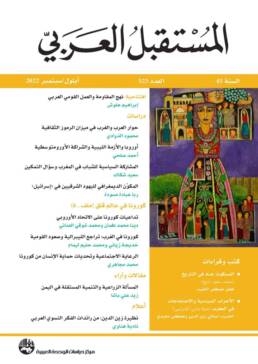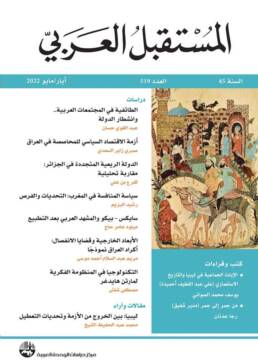⬛ Editorial
⬜ Hope and Optimism for the future of the Arab World Mounir Shafiq 7
⬛ Studies
⬜ Modern Technologies and Asymmetric Warfare
(The War on Gaza 2023) Younis Ba’loosha and Ibrahim Rabaia’ 9
This study addresses the imbalance in asymmetric warfare strategies by analyzing the impact of modern technological advancements on wars between regular armies and irregular groups. The study assumes that equipping regular armies with advanced technologies such as drones, surveillance and reconnaissance tools, and cyber intrusion means enhances their operational capabilities, enabling them to achieve strategic superiority and reduce human and material losses. Conversely, case studies demonstrate how irregular groups have been able to effectively exploit the shortcomings of these technologies—despite their limited resources—to carry out precise, efficient, and low-cost attacks by leveraging deep knowledge of the surrounding geography of their adversaries. This elevates the status of these groups to become influential actors on the international stage.
Keywords: Asymmetric Warfare, Artificial Intelligence, Information, Modern Technology, Regular Armies, Non-Governmental Groups.
⬜ Foundations of National Unity in the Federation of the United Arab Emirates Al-Hussein Othman Al-Sharif Abdulaziz 28
While one of the most important factors driving the formation of unions is addressing issues related to cultural diversity and the challenges of ethnic, religious, and linguistic plurality—as well as protecting the state from external ambitions—the case of the United Arab Emirates is distinct. Emirati society is characterized by the presence of all the essential «elements» of national unity, including shared religion, language, ethnicity, culture, and history. However, these elements require solid foundations and pillars to preserve, support, and develop them.
This research examines the foundations and principles established by the new system to maintain the elements of national unity within the UAE federation. The study concludes that there are looming threats on the horizon, which it analyzes and discusses in detail.
Keywords: UAE Federation, National Unity, Tribal Conflicts, External Threats, British Colonialism, Foreign Interests.
⬜ The Algerian State and the Question of National
Identity Noureddine Theniou 41
In the Algerian context, the relationship between the state and identity is both inseparable and organic. The issue of identity in Algeria continues to raise questions about the foundations of the nation and the potential for their use during the colonial era and the post-colonial moment. While the Arabic language and Islam represented the core components of the nation during colonial rule—and on that basis, independence was justified—these very components later disrupted the process of state-building, leading to instability and bringing the state to the brink of collapse.
The Arabic language remains a subject of endless, unproductive debate, and religion continues to raise a central question: how can it be separated from governance? This ongoing dilemma underscores the strong link between state and identity in Algeria.
Keywords: Algerian State, Arabic Language, Islam, Identity, French Colonialism.
⬜ The Impact of Climate Change on Environmental Movements in
Morocco: A Field Study Al-Habib Estaté Zine Eddine 56
This study aims to observe how civil activism in Morocco has been affected by climate change, and to assess the effectiveness of environmental movements and their ability to respond to the challenges posed by these changes. The paper explores whether the early signs of what could be termed «ecological social movements» are being overlooked—movements that aspire to bring about the desired cultural and political change amid increasing climate fluctuations and their consequences on the rights of current and future generations.
The study concludes that climate change in Morocco has indeed stimulated civil activism. It examines the role of this activism—within its political and cultural context, as well as its origin and operational conditions—in raising awareness and promoting resilience and adaptation. However, the study also notes that the impact and effectiveness of these movements remain limited.
Keywords: Environment, climate change, civil activism, environmental movements, Morocco.
⬜ Religious Social Movement Parties and Diverging
Outcomes? Mohamed Ramadan Bashandi 74
The way a political party is formed significantly influences its developmental trajectory and how it interacts with other political actors in its environment. This study focuses on a specific type of political party—those that originate from social movements, broadly defined as groups of individuals united by the pursuit of certain goals.
The research aims to explain the varied outcomes experienced by parties born from social movements, particularly the differences in their capacity for institutional development, even when operating within relatively similar institutional environments. To that end, the study compares political parties that emerged from the Muslim Brotherhood in Egypt, Ennahda in Tunisia, and the Unity and Reform Movement in Morocco.
Keywords: Social Movements, Political Parties, Muslim Brotherhood, Ennahda, Unity and Reform Movement.
⬜ Israeli-Ghanaian Relations and Their Impact from the War
on Gaza Wadie Abu Sunaynah 100
This paper aims to study and analyze the bilateral relationship between Israel and Ghana over the past ten years, specifically since Tel Aviv reopened its embassy in Accra in 2011. Notably, during the Israeli assault on Gaza starting in October 2023, Ghana’s political behavior appeared to align with that of the Israeli state. This was evident in official statements, voting patterns in the UN Security Council, and bilateral meetings between officials of both countries throughout 2024.
These developments have prompted a need to scrutinize the relationship between the two nations more closely from political, economic, and developmental perspectives over recent years.
Keywords: Africa, Israel, African Union, Ghana, economic relations, Al-Aqsa Flood.
⬜ The Developmental Experience in the Republic of Turkey
(1924–2023) Mohammed Abdul-Salam Ghalib Al-Amri 114
Turkey’s developmental experience represents a model case in the Middle East. Its economic growth and rising geopolitical status in both the region and the world have made it one of the most influential regional powers. Turkey holds a unique geographic position, straddling both Asia and Europe, while also being near Africa. Its vast land area makes it the second-largest country in Europe after the Russian Federation in terms of size.
This study explores the foundations of Turkey’s developmental success that led to its renaissance. It examines the reasons and approaches behind Turkey’s development strategies, and how these have shaped the country’s developmental priorities over the decades.
Keywords: Atatürk, Erdoğan, Turkish role, strategic location, development, democracy, political pluralism, political challenges.
⬜ The Influence of Think Tanks on U.S. Foreign Policy from Trump
to Biden Ahmed Al-Murabti 131
Think tanks play a significant role in shaping U.S. foreign policy by providing research and strategic advice that assists government officials and members of Congress in determining positions and making decisions on various international issues.
This study aims to assess the extent of influence exerted by conservative think tanks during the Trump administration, particularly regarding decisions to withdraw from certain international organizations and agreements, as well as positions on global challenges such as climate change, migration, and human rights. It also evaluates the influence of liberal think tanks on Biden’s foreign policy, especially in relation to containing China, the Russia-Ukraine war, and the Al-Aqsa Flood operation.
Keywords: United States of America, Foreign Policy, International Agreements, Republican Party, Think Tanks, Decision-Making, Trump, Biden.
⬛ Articles and Opinions
⬜ The Returning Administration and Changing Contexts:
Will the U.S. Reassess Its Policy Toward Iran
and Its Oil? Mohammed Mahmoud Mahdi 148
⬛ Books and Reviews
⬜ Current Ecological Currents: An Exercise in Classification and
Modeling (Khalid Shahbar) Mohammed bin Hamour 156
⬜ More Books Gaby El-Khoury 163
Arabic Books: The Synagogue of Ruin: Zionism, Settlement, and Architecture; Political Propaganda and Intelligence; Security Assistance in the Middle East: Protection or Control?; The Role of Political Parties in Democratic Development in the State of Kuwait – A Comparative Study
Foreign Books: Transformative Feminist Mobilization in the Arab Region: A Decade of Activism; China’s Changing Role in the Middle East Filling a Power Vacuum; Vulture Capitalism: How to Survive in an Age of Corporate Greed.
Research Reports: «Where the U.S.-Iran Nuclear Talks Are Headed»; «What a U.S.-Saudi Nuclear «Pathway» Might Mean for the Iran Talks».
Add a review
You must be logged in to post a review.








